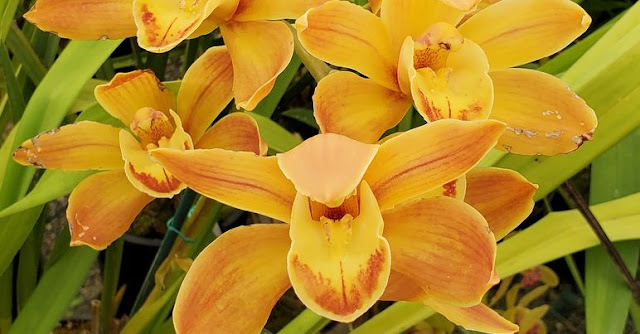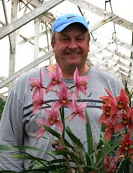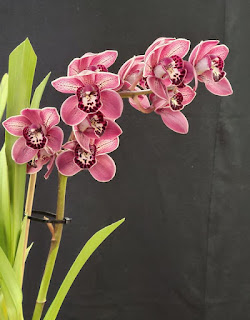
Sacramento society hosts evening with George Hatfield

|
| Cymbidiums need adequate light and water, says expert hybridizer George Hatfield. He will speak Friday evening in Sacramento. (Photos courtesy George Hatfield) |
Orchid royalty is coming to Sacramento!
On Friday evening, Dec. 3, Sacramento Valley Cymbidium Society presents an evening with Mr. Cymbidium, George Hatfield.
To be held at Shepard Garden and Arts Center, this free presentation will be held in person as well as offered via Zoom. Doors open at 6:30 p.m.; program starts at 7 p.m. The public is welcome.

|
|
George Hatfield
|
Based in Oxnard, Hatfield is past president of both the American Orchid Society and the Cymbidium Society of America. In an interview with Orchid Digest, Hatfield shared some of his insights including what he looks for in a plant as a hybridizer.
“Fundamentally, you need to have plants that grow well,” Hatfield told Orchid Digest. “It’s pretty meaningless to produce plants that can’t be grown by all levels of growers. No matter what type of plant you hybridize, it needs to be a good grower. I’ve been aggressively selecting for strong growers for years, and the result is that pretty much everything I produce can be grown by anyone.”
The most common mistake for cymbidium growers? Water, Hatfield said.

|
|
Cymbidiums produce loads of flowers
with the right care.
|
“Cymbidiums need light,” he added. “Most people don’t grow their plants in enough light. The three biggest elements of good culture are light, water, and nutrients. Pay attention to those, and a good cymbidium will reward you with lots of flowers.”
Learn more Friday night at his special presentation. Shepard Center is located at 3330 McKinley Blvd., Sacramento, in McKinley Park.
For more details or Zoom link, email SacCymSoc@yahoo.com or call Ann Carberry at 916-502-3258.
Comments
0 comments have been posted.Sacramento Digs Gardening to your inbox.
Food in My Back Yard Series
April 29: What's (already) wrong with my tomato plants?
April 22: Should you stock up on fertilizer? (Yes!)
April 15: Grow culinary herbs in containers
April 8: When to plant summer vegetables
April 1: Don't be fooled by these garden myths
March 25: Fertilizer tips: How to 'feed' your vegetables for healthy growth
March 18: Time to give vegetable seedlings some more space
March 11: Ways to win the fight against weeds
March 4: Potatoes from the garden
Feb. 25: Plant a fruit tree now -- for later
Feb. 18: How to squeeze more food into less space
Feb. 11: When to plant? Consider staggering your transplants
Feb. 4: Starting in seed starting
Sites We Like
Garden Checklist for week of May 4
Enjoy this spring weather – and get gardening!
* Plant, plant, plant! It’s prime planting season in the Sacramento area. Time to set out those tomato transplants along with peppers and eggplants. Pinch off any flowers on new transplants to make them concentrate on establishing roots instead of setting premature fruit.
* Direct-seed melons, cucumbers, summer squash, corn, radishes, pumpkins and annual herbs such as basil.
* Harvest cabbage, lettuce, peas and green onions.
* In the flower garden, direct-seed sunflowers, cosmos, salvia, zinnias, marigolds, celosia and asters. (You also can transplant seedlings for many of the same flowers.)
* Plant dahlia tubers. Other perennials to set out include verbena, coreopsis, coneflower and astilbe.
* Transplant petunias, marigolds and perennial flowers such as astilbe, columbine, coneflowers, coreopsis, dahlias, rudbeckia and verbena.
* Keep an eye out for slugs, snails, earwigs and aphids that want to dine on tender new growth.
* Feed summer bloomers with a balanced fertilizer.
* For continued bloom, cut off spent flowers on roses as well as other flowering plants.
* Add mulch to the garden to maintain moisture. Mulch also cuts down on weeds. But don’t let it mound around the stems or trunks of trees or shrubs. Leave about a 6-inch to 1-foot circle to avoid crown rot or other problems.